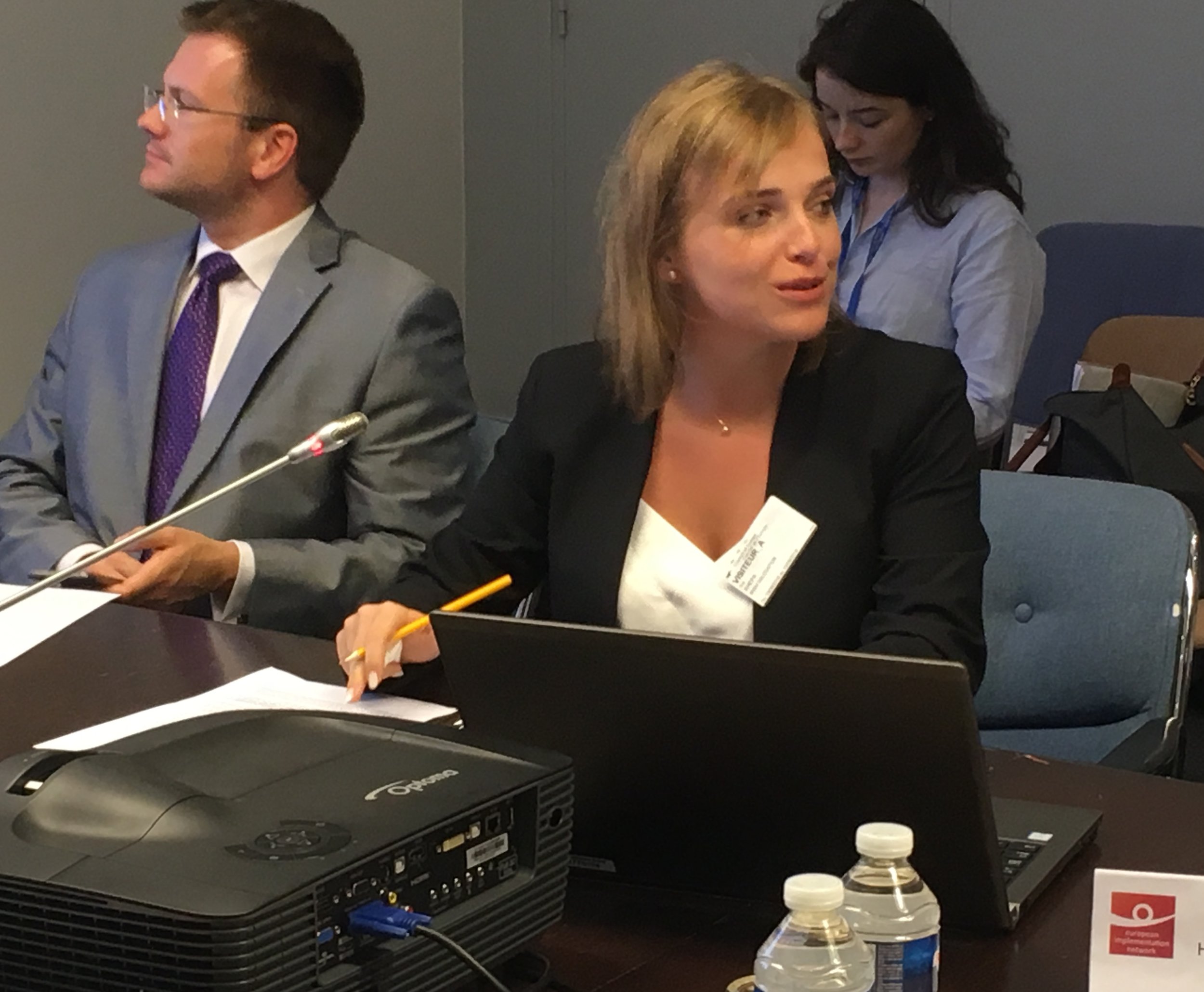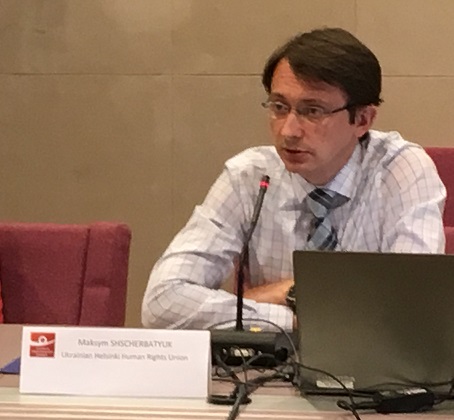Poland, Ukraine, Greece and Albania at the heart of EIN civil society briefing
/The European Implementation Network (EIN) convened a quarterly civil society briefing to Permanent Representations of the Council of Europe on 10 September 2018.
This briefing, which was the third in 2018, focused on analyses by civil society representatives to support the implementation of cases of the European Court of Human Rights (ECtHR) scheduled for review from 18-20 September 2018 at the 1324th Human Rights Meeting of the Committee of Ministers’ Deputies. The Committee is responsible for supervising the judgment execution process.
Representatives of 24 Permanent Representations to the Council of Europe attended the briefing at the Palais de l’Europe.
The following ECtHR judgments were presented and discussed: P. and S. v Poland, Gongadze v Ukraine, Nisiotis Group v Greece and Manushaqe Puto and Others and Driza Group v Albania.
NGO representatives Katarzyna Wisniewska, Olena Protsenko, Simon Palmer (chair), Prof. Konstantinos Tsitselikis and Ina Xhepa. Photo: EIN
A summary of points in the form of main recommendations made by each of the presenters in support of the implementation of the respective cases can be found here.
P. and S. v Poland (Application No 57375/08)
The 2012 judgment in the case of P. and S. v. Poland (application no. 57375/08) is one of three important decisions of the European Court of Human Rights (ECtHR) concerning access to legal abortion in Poland. In all three cases, the ECtHR ruled that the rights of the applicants were violated because of the practical difficulties they experienced in exercising their right to legal abortion. To fully implement these judgments, the Court stated that the national authorities must take steps to guarantee not only theoretical but also practical access to abortion under the conditions provided by law. On 21 September 2017, the Committee of Ministers issued a decision asking the Polish government to present information on the guarantees of effective access to legal procedures for pregnancy termination.
In June 2018, the Polish Government sent a report indicating that, in its opinion, the current regulations ensured effective access both to abortion and to information on the possibility of underdoing such a procedure.
Referring to this Report, Ms Katarzyna Wisniewska, Coordinator of the Strategic Litigation Programme at the Helsinki Foundation for Human Rights (Poland), highlighted that the Polish government did not fully and thoroughly address the matters invoked by the Committee of Ministers in its September 2017 decision. First of all, the procedure of imposing financial penalties on medical facilities for non-performance of the contract with the National Health Fund is not an effective measure to protect women applying for abortion, commented Ms Wisniewska. Second, the date on the complaints filed with the Commissioner for Patients' Rights and the National Health Fund concerning refusals to perform an abortion was not included in the Government’s report.
In terms of recommendations to support implementation of the judgment, Ms Wisniewska therefore noted the need for detailed data on such complaints and the way they were tackled. She also called for detailed information on disciplinary measures against doctors related to the refusal to perform abortion and how they were conducted. Moreover, she expressed her concern that analytical works would be ongoing at the Ministry of Health to amend the provisions concerning the objection to an opinion or decision of the doctor, and insisted on the need to introduce mechanisms to ensure that the right to abortion is not nullified by doctors’ invocation of the conscience clause.
The memo by Ms Wisnieska identifying the main recommendations on the case can be found here. The recent submission of the Helsinki Foundation for Human Rights on the case (August 2018) is available here. The latest communication the Polish authorities submitted on 22 June 2018 can be found here.
Gongadze v Ukraine (Application No 34056/02
From left to right: Olena Protsenko (Ukrainian Helsinki Human Rights Union), speaking about the Gongadze case, and Katarzyna Wisniewska (Helsinki Foundation for Human Rights). Photo: EIN
This case concerns the killing of Georgyi Gongadze, a journalist, in 2000, and lack of effective investigation.
In her briefing, Ms Olena Protsenko, Lawyer at the Centre for Strategic Litigation of the Ukrainian Helsinki Human Rights Union, stated that, with regard to general measures, positive achievements had been reached through the introduction of four new corpus delicti into the Criminal Code of Ukraine. She underlined though that this legislation would only concern – and thus protect – journalists belonging to a certain mass media or a journalist association, and therefore not bloggers or non-professional reporters. In addition, the Ukrainian legislation only applies in cases where criminal proceedings are already open, and does not operate on a rapid response basis to ensure active protection of journalists. With regard to investigation, Ms Protsenko highlighted the lack of effective investigations, and the victims’ inability to access the criminal files during the pre-trial investigation.
Ms Protsenko put forth several recommendations to support implementation of this case, starting first and foremost with the need to adopt a broad notion of media which encompasses all media actors, and to create emergency protection remedies for journalists at risk and their families. She also called for the creation of special investigative units with specialised expertise and methods of investigation for police officers investigating crimes against journalists.
The memo from Ms Protsenko can be found here. The very recent Rule 9.2 submission from the Ukrainian Helsinki Human Rights Union on this case can be found here. The June 2018 Action Plan from the national authorities is here.
Nisiotis Group v Greece (Application No 34704/08)
The Nisiotis Group v Greece concerns the inhuman and/or degrading treatment of the applicants arising from poor conditions of detention in overcrowded prisons in Greece (violation of Art. 3)., notably in Ioannina, Korydallos, Diavata/ Thessaloniki, Alikarnassos, Patra, Larissa, Corfu, Korydallos prison Hospital, Hios, Komotini, Nafplio and Korinthos in relation to more than 1,200 applicants.
Professor Konstantinos Tsitselikis, University of Macedonia-Thessaloniki, Hellenic League for Human Rights, reporting about the state of execution in the Nisiotis group v Greece. Photo: EIN
“The Greek prison system suffers for long from structural deficiencies. Overcrowding is the most important of them”, said Professor Konstantinos Tsitselikis from the University of Macedonia-Thessaloniki, and Member of the Hellenic League for Human Rights, at the start of his presentation.
The governments of the past years sought to build new prisons or to reduce the number of the inmates. Indeed new prisons have been opened (such as in Nigrita, Agia, or Domokos, but partially remain non-operational) and laws passed for early release and favourable arrangements for inmates in cases where smaller sentences are imposed. This helped to drop the total number of inmates by 20% since 2015, but it is still more than ten thousand, a critical threshold affecting the whole prison system in Greece.
With regard to living conditions and health care services, the situation has improved compared to the pre-2015 situation, but not to the point of removing structural problems. Serious infrastructure and staffing problems have not been sufficiently dealt with. The current staffing numbers are inadequate to care for the enormous numbers of inpatients and outpatients (hundreds of inmates are registered as in- and outpatients each month). Although the law provides for the integration of Korydallos Psychiatric Hospital for Inmates and the Prison Hospital, as well as the special treatment facilities for drug-addicted prisoners to the (Public) National Health System (NHS) of the Ministry of Health, in practice prison medical services still belong to the prison administration structure. After long waiting time, a presidential decree for the incorporation of the Korydallos hospital in NHS has been drafted by the Minister of Justice in March 2018, but it is not in force.
The Government’s latest action report to the CM shows that deficiencies are at least acknowledged. However, the “Strategic plan for the prison system 2018-2020” that the government has elaborated, and which entered into force in January 2018, still has not been implemented. In his recommendations, Prof. Tsitselikis therefore asks for full enforcement of the “Strategic plan” of the Government through a specific timetable. Going forward, he also called for the incorporation of the Korydallos hospitals to the NHS and guarantee for proper medical care to all prisoners. He concluded by highlighting the need for allocation of funds for prisons, to upgrade prison premises and staff.
The memo of Professor Tsitselikis can be found here. The September 2018 Rule 9.2 communication from the Hellenic League for Human Rights on this case is here. The July 2018 communication from the Greek authorities concerning this group of cases can be found here.
Manushaqe Puto and Others Group and Driza Group v Albania (Applications No 604/07 and 33771/02)
These cases relate to the non-enforcement of final domestic court and administrative decisions relating to the applicants’ rights to restitution or compensation for property nationalised under the communist regime. In its pilot judgment, the ECtHR ordered the Albanian Government to set up an efficient compensation scheme. In order to do this, the Court found that the authorities needed to provide a list of final judicial and administrative decisions which recognized, restituted and/or compensated former-owners for property, the financial bill stemming from this list, an updated Land Value Map, the adoption of an Action Plan for the enforcement of this Court pilot judgment, and finally the establishment of an effective mechanism for the execution of the aforementioned decisions.
Even though some progress has been made since the delivery of the first Action Plan four years ago, Ms Ina Xhepa, Director of the European Centre (Albania), underlined that further steps were needed.
Ina Xhepa, Director of the European Centre, Albania. Photo: EIN
First, the Property Management Agency (PMA) established by the law should further proceed with the examination of unaddressed claims and applications awaiting a final decision. This process started to be fully operative in December 2017, with a delay of almost two years after the law no. 133/2015 entered into force, due to justified problems such as human resources and pleadings before the Constitutional Court. Ms Xhepa reminded that, whilst up to now about 28% of all pending claims have been addressed, the deadline to finalize the entire evaluation process was February 2019.
Secondly, the amendments made in 20.12.2017 to the by-law which provides the rules and procedures for the evaluation and compensation process entails a real complex process. In addition, the frequent amendments made to the by-laws by the Government, entails a lack of legal certainty toward the owners.
Eventually, the current juridical reform in Albania impacts the whole system, as the Constitutional Court cannot deliberate on any claim presented before it.
In her recommendations, Ms Xhepa therefore called on to the State Authorities to complete the implementation of the Action Plan within the time limits set forth and to accelerate the process of execution of the final decisions which were not appealed at any instance or court.
Ms Xhepa’s memo is available here. The Action Report communicated by the Albanian authorities in August 2018 is here.














